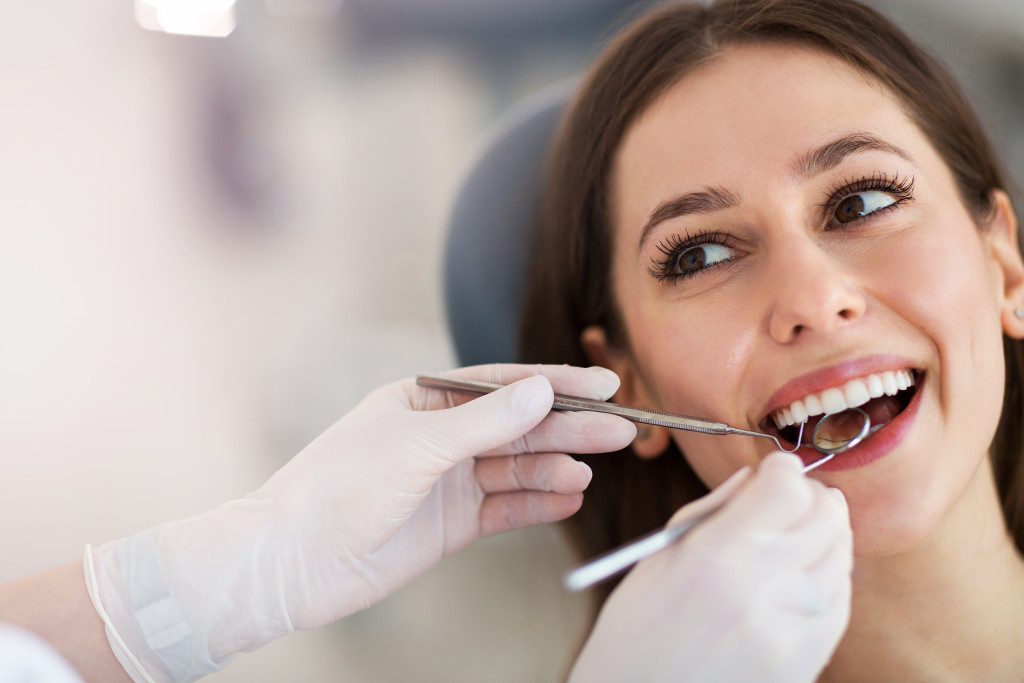- Brush your teeth at least twice daily with a soft-bristled toothbrush and fluoride toothpaste.
- Flossing daily removes food particles from between teeth, eliminates bacteria, prevents bad breath, and improves gum health.
- A balanced diet of fruits, vegetables, whole grains, lean proteins, and dairy products is essential for strong teeth and healthy gums.
- Avoid smoking or using tobacco products to reduce the risk of gum disease and oral cancer.
- Make regular visits to the dental clinic as your dentist recommends for early detection of any potential oral issues.
Taking care of your dental health is essential for maintaining overall well-being. Your oral health affects your ability to eat and speak and plays a crucial role in your confidence and self-esteem. Adopting good dental hygiene habits and regularly visiting the dental clinic can prevent common oral health issues and maintain a healthy smile. This guide will provide five important tips to care for your dental health.
1. Brushing Techniques and Frequency
Proper brushing techniques and frequency are key to maintaining good dental hygiene. You should brush your teeth at least twice daily, in the morning and before bed. Use a toothbrush with soft bristles and fluoride toothpaste to properly clean your teeth. Hold the toothbrush at a 45-degree angle to your gum line and gently make circular motions to clean your teeth’s outer and inner surfaces. Don’t forget to brush your tongue as well, as it harbors bacteria that can cause bad breath.
2. Flossing for Optimal Oral Hygiene
Many people overlook the importance of flossing, but it is essential to maintaining optimal oral hygiene. Flossing helps remove food particles and plaque between your teeth and the gum line. It should be done at least once a day. Wield about 18 inches of dental floss around your middle fingers, leaving about 1-2 inches of floss to work with. Gently slide the floss between your teeth, curving it into a C-shape and ensuring it reaches below the gum line. Repeat this process for each tooth, using a fresh section of floss for each gap.
Here are the benefits of flossing:
Removes Plaque
Flossing helps to remove plaque, the sticky film of bacteria that builds up on your teeth and can lead to cavities if left unchecked. By thoroughly cleaning around each tooth with dental floss, you can help ensure that your mouth stays healthy and clean.
Prevents Bad Breath

Bacteria accumulate between teeth in areas where a toothbrush can’t reach, leading to bad breath (halitosis). Flossing eliminates these bacteria, so you don’t have to worry about offending someone with your breath!
Improves Gum Health
Flossing also removes the plaque and tartar from below the gum line, which helps reduce inflammation of the gums (gingivitis). This is important for keeping your teeth and gums healthy, as gum disease can lead to tooth loss.
Enhances Overall Health
As flossing helps keep your mouth free from harmful bacteria, it also helps reduce your risk of developing serious medical conditions like heart disease and stroke. A regular flossing routine will help you maintain optimal oral health and overall well-being.
3. Balanced Diet for Healthy Teeth and Gums
A balanced diet contributes to your overall health and plays a vital role in maintaining healthy teeth and gums. Limit your sugary and acidic foods intake, as they can contribute to tooth decay and enamel erosion. Instead, focus on consuming various fruits, vegetables, whole grains, lean proteins, and dairy products. These foods provide essential nutrients like calcium, phosphorus, and vitamins A and C, crucial for strong teeth and healthy gums.
4. Avoiding Harmful Habits

Certain habits can have a detrimental effect on your dental health. It’s best to stay away from smoking or using tobacco products to prevent teeth stains, bad breath, and reduce the chances of developing gum disease or oral cancer. Additionally, excessive consumption of alcohol can also contribute to oral health problems. If you indulge in these habits, consider seeking support to quit or reduce your usage to improve your overall dental health.
5. Visits a Dental Clinic Regularly
While maintaining good oral hygiene at home is important, visiting a reputable dental clinic regularly is equally essential. Dentists can identify and treat problems such as tooth decay, gum disease, oral infections, and oral cancer. Aim to schedule dental appointments at least twice a year or as your dentist recommends. Regular visits to the dental clinic will ensure that your teeth and gums are in optimal health and allow for timely intervention if any problems arise.
In Closing
Caring for your dental health is a lifelong commitment that requires daily attention and regular professional care. By following the five tips outlined above — practicing proper brushing and flossing techniques, maintaining a balanced diet, avoiding harmful habits, and making regular visits to the dental clinic, you can significantly reduce the risk of oral health issues. Remember, a healthy smile is aesthetically pleasing and contributes to your overall well-being. Start implementing these tips today and enjoy the benefits of a healthy and confident smile for years.
